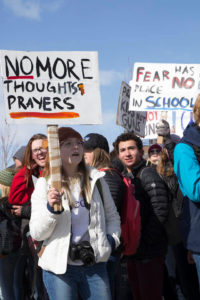James 5:16 (ESV) 16 Therefore, confess your sins to one another and pray for one another, that you may be healed. The prayer of a righteous person has great power as it is working.
Proverbs 15:29 (ESV) 29 The LORD is far from the wicked, but he hears the prayer of the righteous.
 The phrase, thoughts and prayers when tragedy happens just seem to me to be a bit trite. Don’t get me wrong, I think that prayer should be our first duty as a believer in worship and in response to a tragedy. And our “thoughts” for others in pain should lead to “effectual fervent prayer” (James 5:16). But it just seems that the phrase has become a reflexive mantra to tragedy and I suspect that no real action in prayer has taken place. It’s just our way of verbally empathizing with those who have just suffered great loss and pain.
The phrase, thoughts and prayers when tragedy happens just seem to me to be a bit trite. Don’t get me wrong, I think that prayer should be our first duty as a believer in worship and in response to a tragedy. And our “thoughts” for others in pain should lead to “effectual fervent prayer” (James 5:16). But it just seems that the phrase has become a reflexive mantra to tragedy and I suspect that no real action in prayer has taken place. It’s just our way of verbally empathizing with those who have just suffered great loss and pain.
Is there a reason for why I would think this way? There sure is. And it is the same reason so many have lashed out in unbelief and bitterness – NOTHING SEEMS TO HAPPEN!
I don’t blame those who are unbelievers, those outside of Christ, who have not experienced Biblical regeneration, for their strong reaction as of late. But at the same time, it grieves me, not that God is silent, but that few true believers have really, like Nehemiah, at the hearing of bad news (Nehemiah 1:1-3) wept, mourned, fasted, and confessed in prayer. It was his broken heart that drove him to prayer. Like Elijah (1 Kings 17-18; James 1:17-18), Nehemiah came before the Lord, broken. Where is the movement for fervent prayer among believers and our churches to set personal and corporate time aside for our communities and be open to being used as instruments of answered prayer?
For Nehemiah, his prayer life, impassioned his heart (Nehemiah 2:1-2) and moved him to appeal to the king to release him from his duties and organize an action plan that brought him back to Jerusalem to rebuild the wall. It was his prayer life and his dependence on God that caused his “thoughts” to consume him and drive him to prayer and ultimately to action. He became the solution to his own prayers and God moved in his heart.
A movement of national prayer is not the answer either. We need to remember that God does not hear the prayers of those who don’t walk with God in saving faith (Proverbs 15:29; Psalm 18:41; 34:16). Such a movement might be nationally comforting and bring the conscience of the nation to look heavenward, but it is the prayers of His people, the Church, that have power and move God (Psalms 145:18-19) to empower men to real solutions. As Charles Swindoll points out, “Prayer makes me wait, …clears my vision, …quits my heart, activates my faith.”[1] When prayer doesn’t lead to action, it is time to examine our prayer life.
When solutions to tragedies such as Marjory Stoneman Douglas High School in Parkland, Florida, are not addressed by the fervent prayer of God’s people, it becomes of no surprise that the solutions presented are not effective, lack the wisdom of God, and do not speak to the underlying societal causes. Instead, freedom is eroded, and real solutions empowered by the throne of God are not found or ignored.
“Thoughts” that don’t move the people of God to impassioned fervent prayer is meaningless.
[1] Charles R. Swindoll, “Hand Me Another Brick,” Thomas Nelson Inc., Publishers, Nashville, New York, 1978, pg.41
